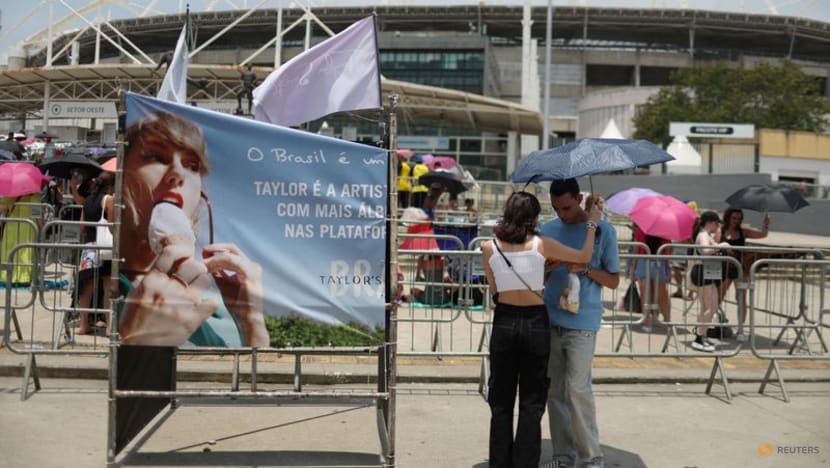Commentary: Takeaways for Singapore event organisers as extreme heat disrupts concerts worldwide
Extreme weather is becoming a problem for concert promoters, performers and fans. As a hub of diverse events, Singapore must take proactive measures, say SUSS’ Luke Peh Lu Chang and Low Wai Ping.

This audio is AI-generated.
SINGAPORE: The death of a young woman at Taylor Swift’s concert in Rio de Janeiro a few months ago triggered an outpouring of grief. Swift wrote on Instagram that she was “devastated” and postponed her second Rio concert, amid a record-breaking heat wave in the city.
Brazilian authorities said in December 2023 that the fan collapsed from heat exhaustion, leading to cardiovascular and respiratory issues. At that time, the heat index, which measures both temperature and humidity, was 59.3 degrees Celsius.
Other concertgoers were reported to have fainted from the heat and suffered burns from the stadium’s metal flooring. They also said they were not allowed to bring drinks into the venue and had difficulty buying water during the show - Swift herself tossed water bottles into the crowd during her performance.
These issues highlight the critical importance of thorough planning and proactive measures to ensure the safety and well-being of attendees at open-air events.
Indeed, extreme weather is becoming a problem for concert organisers worldwide. Ed Sheeran’s Pittsburgh concert in July 2023 saw 17 people hospitalised from heat exhaustion. At Beyonce’s Washington concert in August 2023, fans suffered heat exhaustion while sheltering in a packed concourse while waiting for severe weather, including lightning, to pass.
With Singapore hosting high-profile performers including Taylor Swift, Ed Sheeran and more in 2024, what lessons can it draw from these incidents?
HEAT SAFETY MEASURES
Although Singapore may not experience extreme weather on the same scale as other regions, event organisers face unique challenges due to the country’s hot and humid climate. Temperatures broke records in Singapore last year - the mercury hit 37 degrees Celsius in May 2023, equalling the previous record set in 1983.
On hot days, extended outdoor exposure poses serious health risks. Besides outdoor concerts, sports competitions, cultural festivals and national celebrations can subject attendees to challenging weather conditions, overcrowding and dehydration.
The Workplace Safety and Health Council has guidelines in place for event management, including how to deal with extreme temperatures and various weather elements. These guidelines, meant for the safety of workers, can be easily adapted for event attendees.
Additionally in July 2023, the Ministry of Sustainability and the Environment and the National Environment Agency launched a heat stress advisory, which informs the public of real-time heat-related risks outdoors.
Besides providing these guidelines, government authorities and agencies have spearheaded efforts to establish and enforce comprehensive safety protocols.
These include communication and coordination strategies in the event of a crisis, crowd control measures, emergency evacuation plans, provision of medical facilities, ambulances on standby and first-aid services. These measures enhance the overall safety infrastructure and ensure a swift response to unexpected incidents.
WHAT EVENT ORGANISERS SHOULD CONSIDER
Event organisers should carefully consider weather projections and choose suitable venues to mitigate potential risks. Event services, akin to building services, should prioritise creating a comfortable and safe environment.
Before the concert begins, fans can queue outside stadiums for hours to get prime seats. In anticipation of prolonged exposure to high temperatures, organisers can provide shaded areas for participants and medical emergency services.
They can also adopt comprehensive cooling strategies, such as large fans, air-blowers, evaporative coolers, creative shades and cooling stations.
Attendees also require adequate water intake to prevent dehydration and overheating. Yet concert organisers do not allow participants to bring in their own bottles of water for a variety of reasons.
Promoters might want to cash in on the sales of beverages. Other legitimate reasons include preventing people from sneaking alcohol into the venue, or using the water bottles as weapons when the audience becomes rowdy.
To address the well-being of attendees, organisers can set up kiosks selling or giving away sponsored cold beverages and popsicles. These measures will not only contribute to the overall enjoyment of the event but also play a crucial role in preventing heat-related illnesses.
Event organisers should also send health advisories to the participants, informing them of heat forecasts and tips for staying cool.
Other strategies could involve reserved seating so fans need not wait for hours outside to get a spot. An unpopular option could be to cancel or postpone the concert should the heat forecast be dangerously high.
PARTICIPANTS CAN TAKE CHARGE OF THEIR OWN SAFETY
Participants too should take charge of their own safety. They need to be aware of what heat stress is and protect themselves by wearing loose, breathable clothing and drinking plenty of fluids.
They should watch themselves and others for symptoms of heat-related illnesses, such as profuse sweating, dizziness and nausea. In case someone falls ill, they should help by moving them to a cooler place, removing tight clothing, getting them hydrated and seeking medical help.
The tragic loss of life at Taylor Swift’s concert is a reminder that safety at open-air events must be prioritised. As Singapore continues to be a hub for diverse events, proactive measures are crucial to ensure a secure and enjoyable experience for all participants.
At the end of the day, safety is a shared responsibility among event organisers, government agencies, artistes and fans.
Associate Professor Luke Peh Lu Chang is the Vice Dean for the School of Science and Technology and Associate Professor Low Wai Ping is the Head for the Events Management Programme at Singapore University of Social Sciences.










